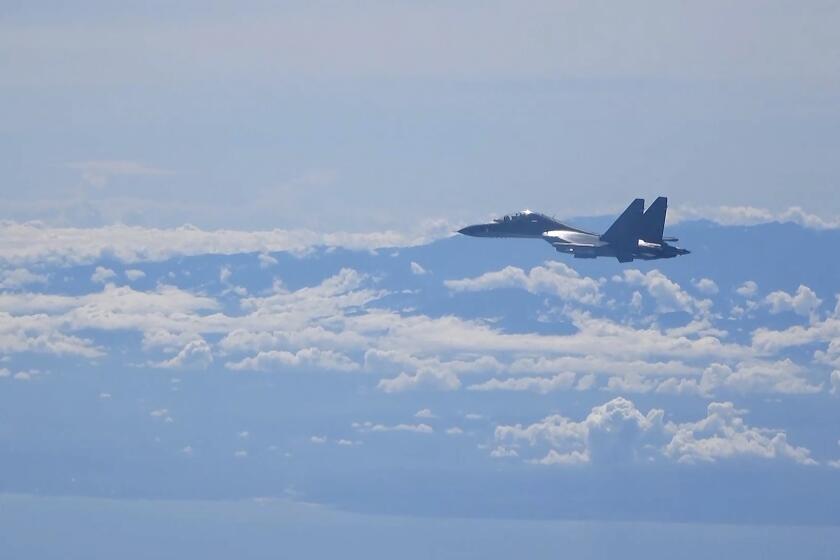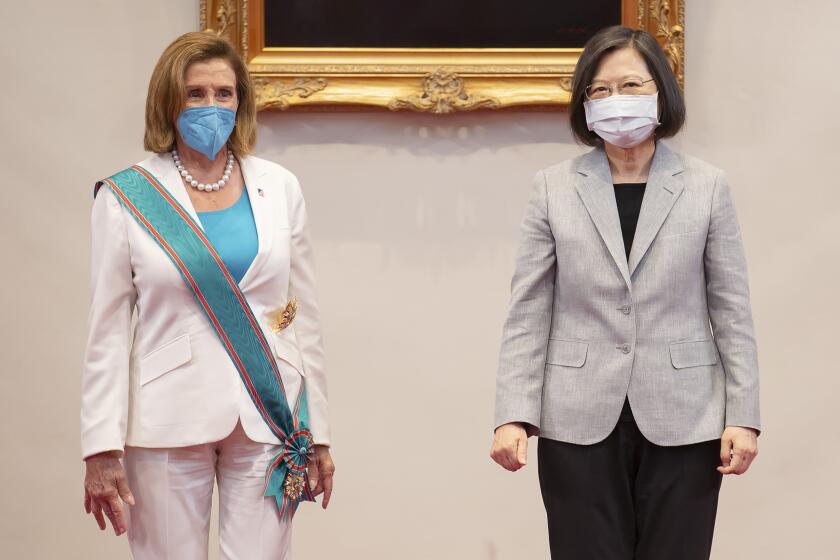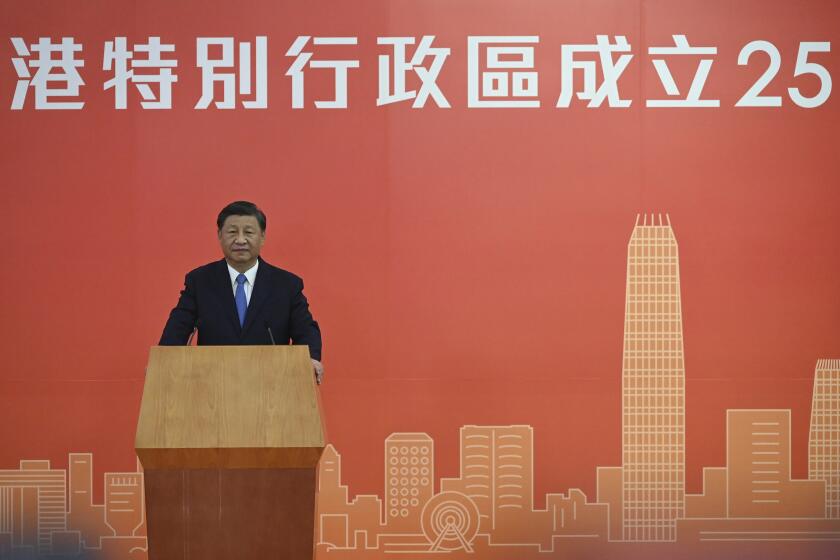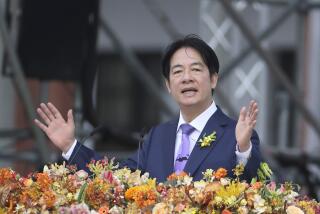U.S. to hold trade talks with Taiwan amid heightened tensions with China
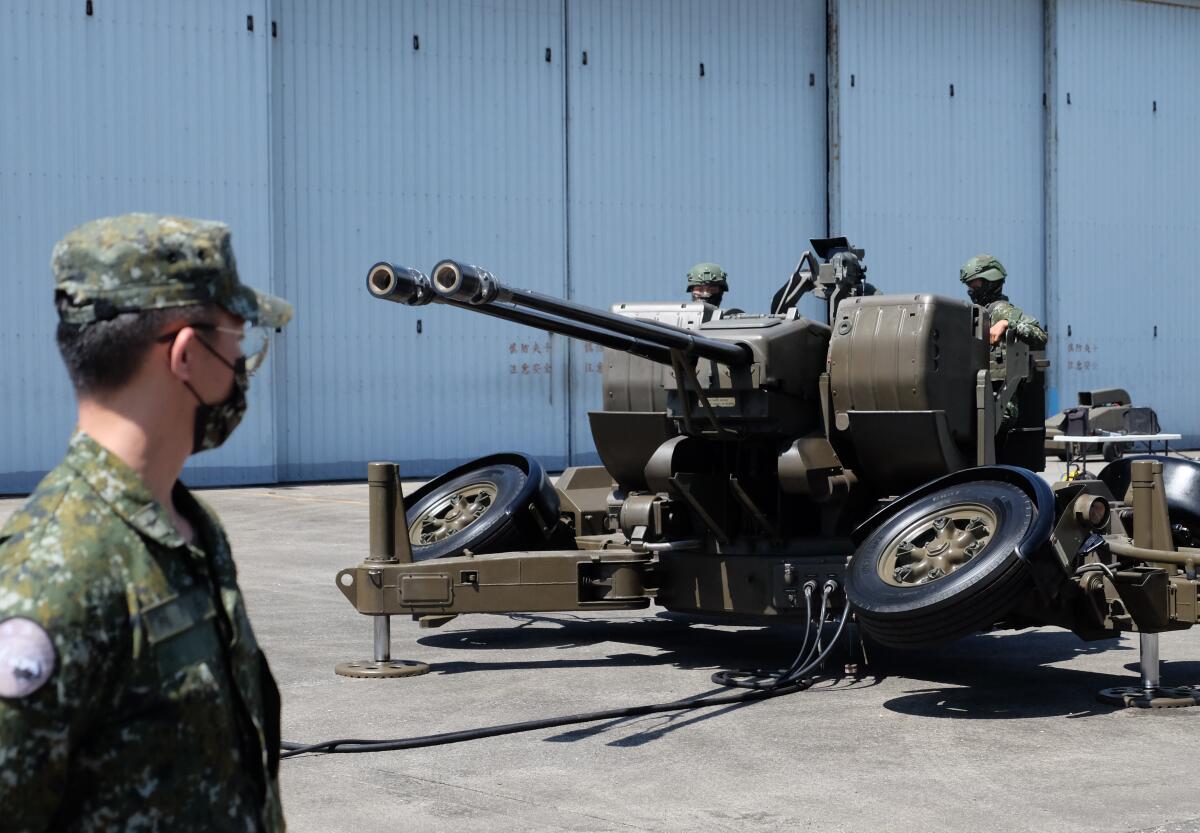
HUALIEN, Taiwan — The U.S. government Thursday announced trade talks with Taiwan in a sign of support for the self-ruled island that China claims as its territory, prompting a warning by Beijing that it will take action if necessary to “safeguard its sovereignty.”
The announcement comes after Beijing fired missiles into the sea to intimidate Taiwan after U.S. House Speaker Nancy Pelosi (D-San Francisco) this month became the highest-ranking American official to visit the island in 25 years.
Chinese President Xi Jinping’s government criticized the planned talks as a violation of its stance that Taiwan has no right to foreign relations. It warned Washington to not encourage the island to try to make its de facto independence permanent, a step Beijing says would lead to war.
“China firmly opposes this,” said Ministry of Commerce spokeswoman Shu Jueting. She called on Washington to “fully respect China’s core interests.”
Also Thursday, Taiwan’s military held a drill with missiles and cannon simulating a response to a Chinese missile attack.
Taiwan and China split in 1949 after a civil war and have no official relations but are bound by billions of dollars of trade and investment. The island never has been part of the People’s Republic of China, but the ruling Communist Party has threatened to reunify Taiwan with the mainland, by force if necessary.
Chinese warships and aircraft crossed the median line of the Taiwan Strait following U.S. House Speaker Nancy Pelosi’s visit to Taipei.
President Biden’s coordinator for the Indo-Pacific region, Kurt Campbell, said last week that trade talks would “deepen our ties with Taiwan” but stressed that U.S. policy wasn’t changing. The U.S. has no diplomatic relations with Taiwan, its ninth-largest trading partner, but maintains extensive informal ties.
The U.S. trade representative’s announcement of the trade talks made no mention of tension with Beijing but said “formal negotiations” would develop trade and regulatory ties, a step that would entail closer official interaction.
Being allowed to export more to the U.S. might help Taiwan blunt China’s efforts to use its status as the island’s biggest trading partner as political leverage. The mainland blocked imports of Taiwanese citrus and other food in retaliation for Pelosi’s Aug. 2 visit.
Taiwan’s Foreign Ministry welcomed the trade talks, which it said would lead to a “new page” in relations with the U.S.
China’s furious response could drive more Taiwanese toward independence and push neighboring Asian nations to strengthen their defense strategies.
“As the situation across the Taiwan Strait has recently escalated, the U.S. government will continue to take concrete actions to maintain security and stability across the Taiwan Strait,” the ministry said.
Sino-U.S. relations are at their lowest level in decades amid disputes over trade, security, technology and Beijing’s treatment of Muslim minorities and Hong Kong.
The U.S. trade representative said negotiations would be conducted under the auspices of Washington’s unofficial embassy, the American Institute in Taiwan.
“China always opposes any form of official exchanges between any country and the Taiwan region of China,” said Shu.
Breaking News
Get breaking news, investigations, analysis and more signature journalism from the Los Angeles Times in your inbox.
You may occasionally receive promotional content from the Los Angeles Times.
“China will take all necessary measures to resolutely safeguard its sovereignty.”
Washington says it takes no position on the status of China and Taiwan but wants their dispute settled peacefully. The U.S. government is obligated by federal law to see that the island has the means to defend itself.
“We will continue to take calm and resolute steps to uphold peace and stability in the face of Beijing’s ongoing efforts to undermine it, and to support Taiwan,” Campbell said during a conference call Friday.
Following Pelosi’s visit, a second group of U.S. lawmakers led by Sen. Edward J. Markey (D-Mass.), arrived in Taiwan on Sunday and met with President Tsai Ing-wen. Beijing announced a second round of military drills after the delegation’s arrival.
Chinese President Xi Jinping visits a vastly transformed, Beijing-controlled Hong Kong, which is now ‘just another Chinese city,’ one expert says.
Taiwan, home to 23.6 million people, has launched its own military exercises in response.
On Thursday, drills at Hualien air base on the east coast simulated a response to a Chinese missile attack. Military personnel practiced with Taiwanese-made Sky Bow 3 antiaircraft missiles and 35-millimeter antiaircraft cannon but didn’t fire them.
“We didn’t panic” when China launched military drills, said Air Force Maj. Chen Teh-huan.
“Our usual training is to be on call 24 hours aday to prepare for missile launches,” Chen said. “We were ready.”
The talks with Taiwan also will cover agriculture, labor, the environment, digital technology, the status of state-owned enterprises and “nonmarket policies,” the U.S. trade representative said.
Washington and Beijing are locked in a 3-year-old tariff war over many of the same issues.
More to Read
Sign up for Essential California
The most important California stories and recommendations in your inbox every morning.
You may occasionally receive promotional content from the Los Angeles Times.
